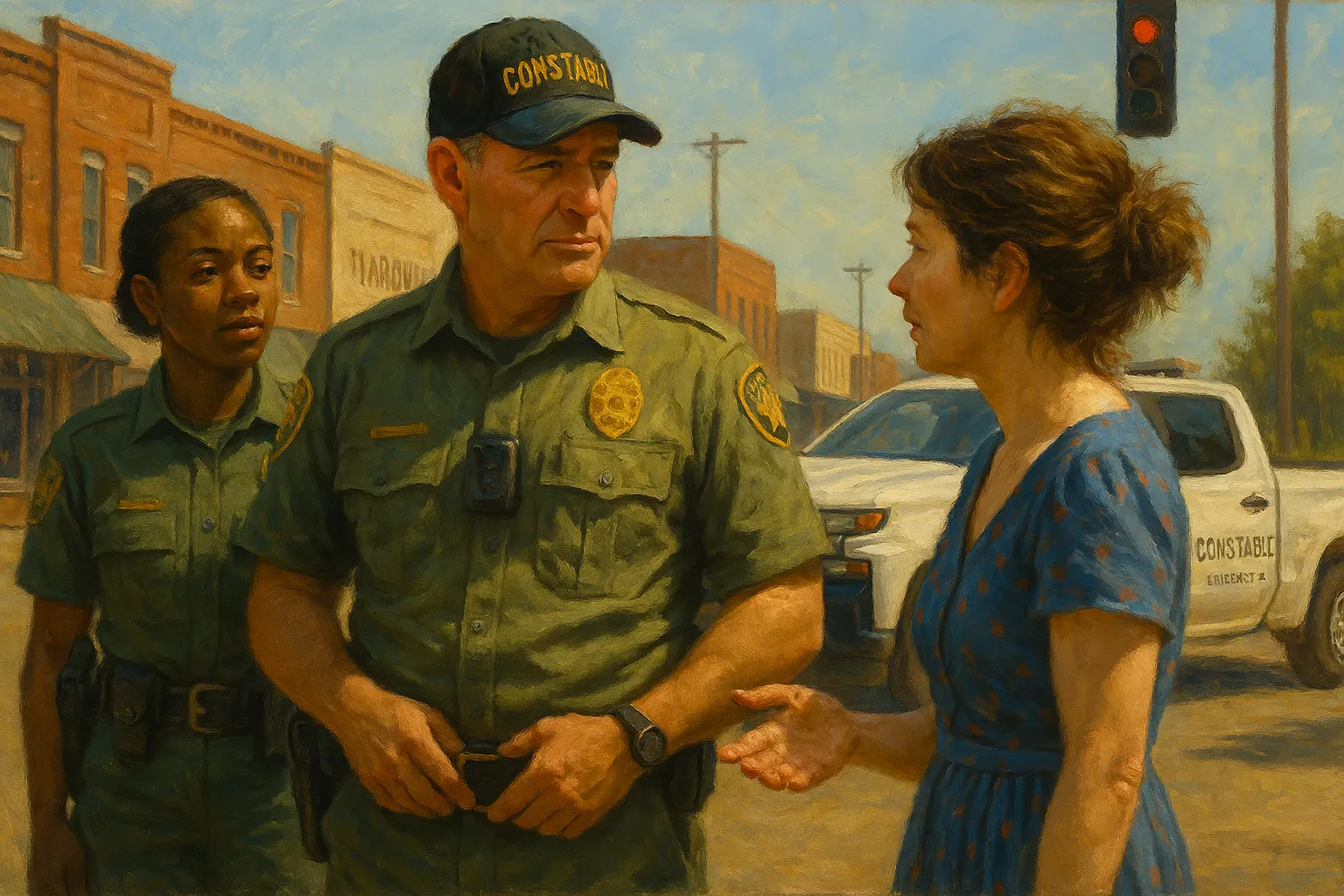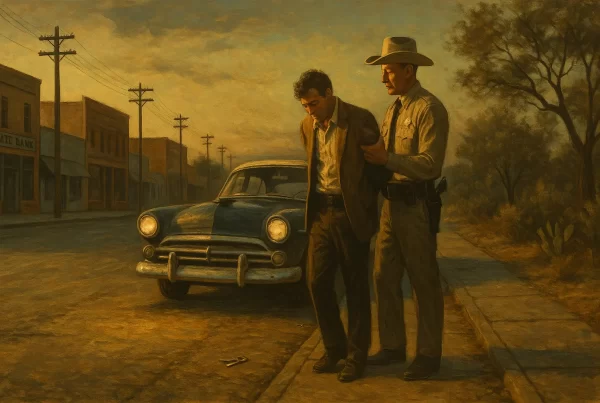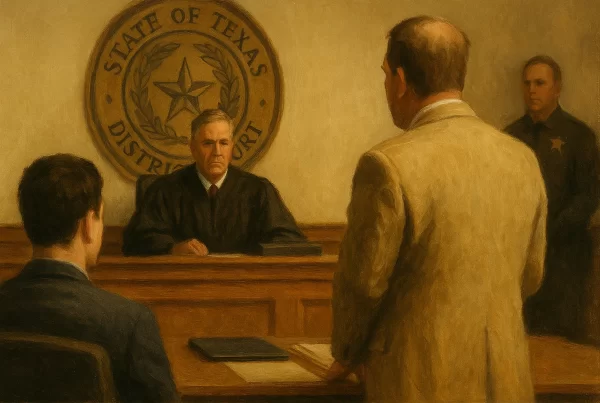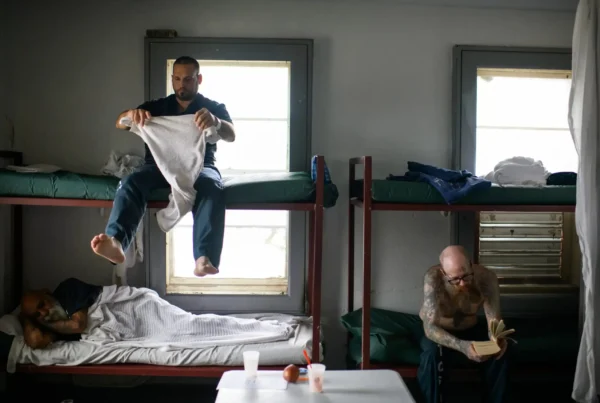Overview of the Texas System
In Texas, law enforcement officers are known as “peace officers,” a term that reflects their primary duty to preserve peace and protect the public. The responsibilities of peace officers are diverse, ranging from investigating crimes and executing arrests to responding to highway emergencies and disasters.
With approximately 81,000 sworn officers spread across more than 2,800 local and state law enforcement agencies, Texas has one of the largest and most complex law enforcement systems in the United States. These agencies include county sheriff’s offices, municipal police departments, and the Texas Department of Public Safety, which coordinates statewide efforts.
Additionally, the state employs approximately 24,000 jailers to operate prisons and jails, which house the largest inmate population in the United States.
Texas law enforcement is governed by a combination of state statutes, local regulations, and federal civil rights, as articulated in the Bill of Rights of the U.S. Constitution, which help define the powers, duties, and limitations of officers. The independent state judiciary provides judicial oversight of the actions of officers, including arrests and searches.
Levels of Law Enforcement in Texas
| Type of Peace Officer | Employed By |
|---|---|
| FBI, Marshals, DEI, ATF | Federal |
| Highway Patrol | State |
| Rangers | State |
| Game Wardens | State |
| Sheriffs | Counties |
| Constables | Counties |
| Police | Cities |
| School Police | Independent School Districts |
| University Police | Public Universities |
| Transit and Port Police | Transit and Port Authorities |
The different levels of law enforcement in Texas are not a hierarchy per se. Rather, different levels of the system have different assignments, specializations, and jurisdictions.
Local Law Enforcement
Texas has about 788 municipal police departments. The Dallas Police Department, Houston Police Department, and San Antonio Police Department are among the largest law enforcement agencies in Texas.
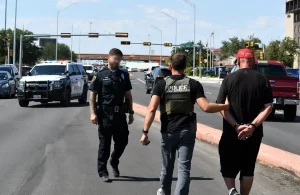
Additionally, Texas has 254 sheriff’s offices — one in each county. Sheriffs and their deputies generally provide public safety in rural areas, while municipal police departments fulfill that role in cities (though even urban Texas counties have their own sheriff).
Sheriffs have the additional responsibility of running local jails that hold misdemeanor convicts and pre-trial defendants. Texas counties employ more than 20,000 jailers.
Other local law enforcement include college and university police, county constables, school district police, and, in some cities, transit police.
Local law enforcement in Texas operate under standards set by the Texas Commission on Law Enforcement. This regulatory agency, however, provides little direct oversight of local law enforcement. Instead, each agency is accountable to its own local governing body — for instance, a school board in the case of school district police. Additionally, the Texas judiciary plays a critical role in ensuring the due process rights of criminal defendants.
Some local law enforcement agencies consist of only a few officers, or in some cases, just one officer. Critics of this system, including the Texas Sheriffs’ Association, have said that the state has too many agencies, making it difficult to ensure that minimum standards are met.
State Law Enforcement
Texas State Police
The largest state law enforcement agency in Texas is the Department of Public Safety, which employs the Texas Highway Patrol (also called state troopers or state police) and the Texas Rangers, as well as a Criminal Investigation Division, Crime Laboratory Division, and an air wing.
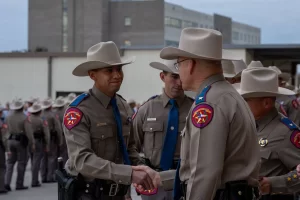
The Department of Public Safety (DPS) is responsible for a wide range of law enforcement duties across the state, including highway patrol, investigating major crimes and public corruption, and assisting local law enforcement agencies during large-scale events or disasters. The agency also manages certain statewide administrative functions such as issuing driver’s licenses.
In total, there are approximately 4,000 Texas Highway Patrol officers (state police) employed by the Department of Public Safety, 230 Texas Rangers, 800 members of the Criminal Investigations Department, nearly 3,000 members of the Driver’s License Division, and thousands of other specialists, administrators, support staff, and technology professionals.
Specialist Agencies
Additionally, a few other state agencies employ peace officers, including the Department of Criminal Justice, the Department of Parks and Wildlife (Game Wardens), the Alcoholic Beverage Commission (Enforcement Division), and the Attorney General’s Office. The officers employed by these departments have all the standard powers of peace officers but are typically assigned to specialized roles.
Powers and Duties of Officers
The powers and duties of Texas law enforcement officers are enumerated in the Texas Code of Criminal procedure and other laws, and are also defined by local regulations, such as policies set by a city council or county government. Law enforcement practices thus vary somewhat throughout the state.
In general, the powers of law enforcements officers include the following:
- Patrol public areas and perform surveillance of suspected criminal activity.
- Conduct investigations at crime scenes, including by gathering physical evidence, video evidence, witness statements, etc.
- Enforce traffic laws by issuing tickets or arresting offenders in more serious cases, such as driving while intoxicated.
- Arrest, without warrant, when the officer has witnessed a felony crime or a breach of the peace, i.e., behavior that threatens the safety of others.
- Arrest, without warrant, if the officer has probable cause to believe that a person has committed assault or an offense involving family violence.
- Present case information to a judge to obtain an arrest warrant.
- Execute an arrest warrant or search warrant against a person suspected of having earlier committed a crime.
- Meet with prosecuting attorneys to provide them information for filing charges.
- Prepare evidence for grand jury presentations, and make other court appearances during trials against alleged offenders.
Anyone arrested by a law enforcement officer in Texas must be brought before a judge within 48 hours. The judge will inform the detainee of the charges against him or her and make a decision whether to continue the detention, in which case the judge will also set conditions for bail, or release him or her.
Federal Agencies in Texas
In addition to the state and local agencies working in law enforcement, there are dozens of federal law enforcement offices in Texas, including offices for the Bureau of Alcohol, Tobacco, Firearms and Explosives (ATF); Customs and Border Protection; Drug Enforcement Administration (DEA); Federal Bureau of Investigation (FBI); Immigration and Customs Enforcement (ICE); Secret Service; and U.S. Marshals.
Qualifications and Licensing
In order to become licensed as a peace officer in Texas a candidate must meet minimum standards for enrollment, pass a basic licensing course, pass a state licensing examination, and receive an appointment by a law enforcement agency.
The minimum enrollment requirements for training include:
- U.S. citizen
- High school diploma, equivalency certificate, or honorable discharge from the U.S. armed forces after at least 24 months of active duty service.
- Physically fit for the performance of duty
- Pass a drug test
- Never convicted of any family violence offense
- Able to drive a motor vehicle
- Allowed to possess a firearm
- Not facing any criminal charges
- Never convicted of any offense above the grade of Class B misdemeanor in the last 10 years
- At least 21 years of age, or 18 years if the applicant has received an associate’s degree or 60 semester credit hours from a college or university.
Working in Law Enforcement in Texas
Training and Career Development
Training to become a peace officer in Texas involves studying criminal law, firearms handling, defensive tactics, and crisis intervention. Officers may also specialize in areas like SWAT, K-9, or narcotics depending on the department’s needs.
Texas law enforcement officers are required by law to complete at least 40 hours of continuing education every two years, including a unit about recent legislative changes. Additionally training requirements apply on a four-year cycle.
Special training requirements apply to police chiefs, constables, university peace officers, and jailers. For example, constables must complete a course in civil process every four years.
Collective Bargaining and Labor Rights
In Texas, most law enforcement officers are employed on an at-will basis, meaning they can be terminated without cause. However, officers in some larger cities and counties have negotiated collective bargaining agreements (CBAs) with police unions. These agreements typically cover salaries, benefits, working conditions, and disciplinary processes.
While collective bargaining exists in some regions, Texas generally does not allow statewide collective bargaining for public employees, limiting the ability of officers to negotiate for broader labor protections.
Job Challenges
Law enforcement officers in Texas face demanding work conditions, including long hours and high-stress situations. Mental health challenges such as PTSD and burnout are common, leading some departments to implement wellness programs and peer support systems.
Career Opportunities and Advancement
Law enforcement in Texas offers a variety of career paths and opportunities for advancement. Officers may begin their careers in patrol or general assignments but can later transition into specialized units or leadership positions. Specialized roles include investigations, narcotics, forensic analysis, cybercrime, traffic enforcement, and SWAT. These specialized units often require additional training and experience.
As officers gain experience, they may also have the opportunity to move into supervisory roles, such as sergeant, lieutenant, or captain, where they oversee personnel, manage operations, and handle administrative duties. Additionally, agencies such as the Texas Rangers or state and federal law enforcement agencies provide opportunities for officers to work on high-profile cases and complex investigations.
Agencies often support professional growth by providing additional training, leadership development programs, and tuition assistance for higher education. Officers seeking to advance their careers may also pursue certifications or graduate degrees in fields like criminal justice or public administration.
